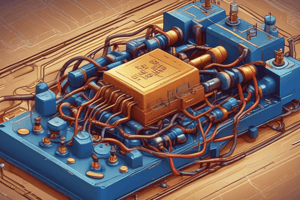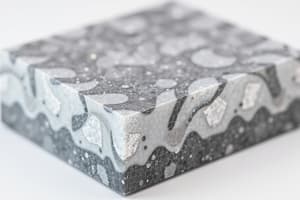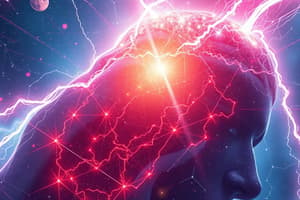Podcast
Questions and Answers
What are dielectrics?
What are dielectrics?
- Non-conducting substances that respond to external electric fields by inducing dipole moments in their molecules. (correct)
- Conducting substances that respond to external magnetic fields by inducing dipole moments in their molecules.
- Conducting substances that respond to external electric fields by inducing dipole moments in their molecules.
- Non-conducting substances that respond to external magnetic fields by inducing dipole moments in their molecules.
What is the effect of the molecular dipole moments produced by dielectrics in response to an external electric field?
What is the effect of the molecular dipole moments produced by dielectrics in response to an external electric field?
- They produce a field that opposes the external field, reducing its strength. (correct)
- They increase the strength of the external field.
- They produce a field that enhances the external field, increasing its strength.
- They have no effect on the external field.
What is a capacitor?
What is a capacitor?
- A device that converts electric energy into magnetic energy.
- A device that stores electric energy. (correct)
- A device that converts magnetic energy into electric energy.
- A device that stores magnetic energy.
What is the potential difference between the conductors in a capacitor proportional to?
What is the potential difference between the conductors in a capacitor proportional to?
What is Lenz's Law?
What is Lenz's Law?
What is Experiment 6.1 used for?
What is Experiment 6.1 used for?
What is the power output of an electric generator?
What is the power output of an electric generator?
What are dielectrics?
What are dielectrics?
What is the effect of the molecular dipole moments produced by dielectrics in response to an external electric field?
What is the effect of the molecular dipole moments produced by dielectrics in response to an external electric field?
What is a capacitor?
What is a capacitor?
What is the potential difference between the conductors in a capacitor proportional to?
What is the potential difference between the conductors in a capacitor proportional to?
What is Lenz's Law?
What is Lenz's Law?
What is Experiment 6.1 used for?
What is Experiment 6.1 used for?
What is the power output of an electric generator?
What is the power output of an electric generator?
What are dielectrics?
What are dielectrics?
What is the effect of the molecular dipole moments in dielectrics?
What is the effect of the molecular dipole moments in dielectrics?
What is the function of an insulator in a capacitor?
What is the function of an insulator in a capacitor?
What is the potential difference between the conductors in a capacitor proportional to?
What is the potential difference between the conductors in a capacitor proportional to?
What does Lenz's Law state?
What does Lenz's Law state?
What does Experiment 6.1 demonstrate?
What does Experiment 6.1 demonstrate?
What determines the direction of the induced current in an electric generator?
What determines the direction of the induced current in an electric generator?
Flashcards are hidden until you start studying
Study Notes
Dielectrics, Capacitors, and Lenz's Law
- Dielectrics are non-conducting substances that respond to external electric fields by inducing dipole moments in their molecules.
- The collective effect of the molecular dipole moments produces a field that opposes the external field, reducing its strength.
- In a capacitor, two conductors with opposite charges are separated by an insulator, and the electric field between them is proportional to the charge.
- The potential difference between the conductors is proportional to the charge, and the ratio of charge to potential is a constant.
- Lenz's Law states that the polarity of the induced emf in a coil is such that it opposes the change in magnetic flux that produced it.
- Lenz's Law can be understood through Experiment 6.1, where the induced current in a coil opposes the increase or decrease in magnetic flux caused by the approach or withdrawal of a magnet.
- An electric generator consists of a rotating coil in a uniform magnetic field, where the changing area of the coil exposed to the field induces an emf.
- The angle between the magnetic field and the area vector of the coil changes with time, causing the flux to change with time as well.
- The induced emf produces a current in the external circuit connected to the ends of the coil through slip rings and brushes.
- The direction of the induced current is determined by Lenz's Law and can be used to predict the direction of motion of the coil.
- The induced current produces a magnetic field that interacts with the original magnetic field to produce a torque on the coil, causing it to rotate.
- The power output of the generator is the product of the induced emf and the current in the external circuit.
Studying That Suits You
Use AI to generate personalized quizzes and flashcards to suit your learning preferences.




